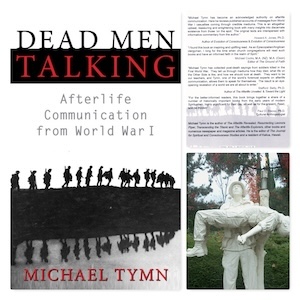|
A Peek into one of many White Crow Books
On September 14, 1915, Second Lieutenant Raymond Lodge, the youngest of six sons of Sir Oliver Lodge, a distinguished British physicist and pioneer in electricity and radio, as well as the former president of the British Association for the Advancement of Science, was killed in WWI action in Flanders. Eleven days later, on September 25, Raymond began communicating with Sir Oliver and Lady Lodge through the mediumship of Gladys Osborne Leonard and Alfred Vout Peters. Sir Oliver’s 1916 book, Raymond or Life and Death, was released a year or so later and became a best seller, providing comfort to many grieving parents whose children had also died in the war. The first chapter of my book, Dead Men Talking summarizes Sir Oliver’s book, including the following.

Mrs. Leonard was primarily a trance-voice medium, but occasionally communication came by table tilting, one tilt for each letter of the alphabet. In one such table sitting, on September 28, the table began to tilt and Raymond identified himself by his nickname, Pat. As a further test of identity, Sir Oliver asked him to name one of his five brothers. The table spelled out N-O-R-M-A- before Sir Oliver interrupted and commented that Raymond was confused. He told him to begin again. The name N-O-E-L was then spelled out, which was one of Raymond’s brothers. It was not until Sir Oliver later discussed this with his other sons that it began to make sense. His sons explained to him that “Norman” was a kind of general nickname used by Raymond when they played hockey together. He would shout “Now then, Norman,” or other words of encouragement, to any of his older brothers whom he wished to stimulate. Lodge saw this as evidence against telepathy, since neither he nor Lady Lodge knew of the name.
Alec Lodge, one of Raymond’s brothers, sat with Mrs. Leonard on December 21, 1915. As a test of his own, Alec asked Raymond about his favorite music. Alec noted that he then heard Feda, Leonard’s spirit control, questioning Raymond, asking him sotto voce (whispering) “An orange lady?” Still confused, Feda (speaking through Leonard’s vocal cords) then told Alec that “He says something about an orange lady.” Alec felt that this was very evidential as “My Orange Girl” was the last song Raymond bought when “alive.” Raymond also mentioned “Irish Eyes,” another of his favorites.
By the time Sir Oliver sat with Mrs. Leonard on March 3, 1916, he was convinced that she was not a charlatan, but he still felt a need to test her in various ways. Thus, at a sitting with her that day, he asked Raymond if he knew about “Mr. Jackson.” Feda struggled with understanding Raymond’s response, but she communicated: “Fine bird…put him on a pedestal.” This was especially evidential as Sir Oliver was certain that Leonard did not know that Mr. Jackson was the name of Lady Lodge’s pet peacock, nor that it had died a week earlier and was in the process of being stuffed and mounted on a wooden pedestal.
On May 26, 1916, Lionel Lodge and his sister, Norah, drove from the Lodge home, near Birmingham, to London for a sitting. Knowing that his brother and sister were scheduled to meet with Mrs. Leonard at noon, Alec Lodge asked two other sisters, Honor and Rosalynde, to sit with him in the drawing room and focus on asking Raymond to get the word “Honolulu” through to Lionel and Norah during the sitting. Lionel and Norah knew nothing of this request.
When Sir Oliver later read Lionel’s notes of the sitting, he saw that Raymond said something about Norah playing music. Norah replied that she could not. Feda (through Leonard’s voice) then whispered to the invisible Raymond (attention directed away from Lionel and Norah), “She can’t do what?” Upon getting a response from Raymond, Feda than said, “He wanted to know whether you could play Hulu – Honolulu. Well, can’t you try to? He is rolling with laughter.”
By the end of April 1916, a preponderance of evidence that Raymond had been communicating with them had been accumulated by the Lodge family. “The number of more or less convincing proofs which we have obtained is by this time very great,” Sir Oliver wrote, adding that some of them appeal more to one person, some to another; but taking them all together every possible ground of suspicion or doubt seemed to the family to be removed.—MET
|